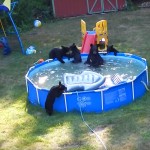5 Tips For Giving The Perfect Toast No Matter The Occasion
You’re at an awards dinner. Or maybe it’s a grand opening, or even a retirement party. You’re asked to say a few words, but you aren’t sure how to do it. How do you find the right level of mush—not too mushy, but just mushy enough? It’s a special occasion, so you want to give your audience a warm feeling, but you don’t want to get too corny and make them cringe. Here are five simple tips to bear in mind for your next toast.
1. Start With The Obvious
When you gather together for a celebration, you share the same physical space with your audience. You all experience the same setting—the decor and so on. Yet inside, each of you still inhabits your own little world—noting the buzz of your smartphone, the thoughts in your head about the food or the people you’re seated next to. So the first challenge any master of ceremonies or toast-maker faces is simply connecting with their audience by sharing the same mental space as well.
The easiest way to create that connection, of course, is simply to talk about what’s in common with everyone: Why are you here together in the first place? When you begin with the obvious, it’s like listening to the first notes of a familiar tune—everyone gets into the same groove.
For example, if you’re celebrating a retirement, you could begin by saying something like, “We’re here today to celebrate a transition—from ending to beginning, from the familiar to the unknown, from one challenge to another challenge.” This may not sound especially original to you, but it’s an effective way to quickly set the tone. By giving voice to the common experience, you bring the audience together, forging a feeling of unity.
2. Share Something About Yourself
From there, it’s time to move away from anything potentially trite. Now that you have your audience thinking about the same thing, you want to instill a common feeling about it while also consolidating their focus on you. The easiest way to do that is by telling them a quick story about yourself that’s relevant to the situation.
Don’t worry—you aren’t stealing the spotlight. Here’s an example I might use from my own experience:
I remember the day in Montreal when I received a letter from the Quebec government. I had applied for a scholarship to achieve my dream of doing to graduate school. Would I be one of two people in the province to win the scholarship? My hands were shaking as I opened the letter. I was selected! That letter changed my life. Today, you too have opened a new envelope, achieved a new opportunity, forged a new beginning—and reached a new level of achievement.
By revealing personal moments like these, you establish a measure of trust that helps your audience feel open positively and open to what you have to say.
3. Stick With Short Sentences.
Nothing kills attention faster than somebody who drones on and on. The best remedy for that is to speak in short sentences. The shorter the sentence, the greater the punch.
For example, instead of saying, “David is a great asset to our company because he is a hard worker, he never complains, and nobody deals with customers better than he does,” you could phrase it this way: “David is a great asset to our company. He’s a hard worker. He never complains. Nobody deals with customers better.” It doesn’t mean cutting content, just breaking it into more digestible units.
4. Dare To Be Different
Recently I was at a wedding where the best man stood up, looked at the bride and groom, and began singing “Let It Go” from the movie Frozen (with a few special lyrics of his own). Now, singing a capella at a wedding may be a stretch for most of us, but he did get a standing ovation.
Don’t hesitate to capitalize on your unique talents. Most toasts send pretty formulaic, so if there’s something that only you can do that seems tasteful and appropriate to the situation, go for it! How you decide to make the occasion memorable is up to you, but make sure you find a way to stand out.
5. Make Sure You Don’t Embarrass Anyone
If you’re celebrating someone’s achievement or toasting a friend at a wedding, it can be tempting to include an embarrassing story to get a laugh out of an audience. While this may work in certain circumstances, it’s a risky proposition.
You may be confident in the other person’s sense of humor, but that special moment might not be the right time for having a laugh at their expense. And even if they enjoy it, you might make the rest of the crowd uncomfortable. So unless you’re absolutely sure you have a winner of a story, keep it positive.
Toasts can be nerve-wracking because it’s only on rare occasions that we actually have to stand up and give them. But keep these basic pointers in mind and you’ll leave your listeners with something memorable—for the right reasons.
Fast Company , Read Full Story
(14)













